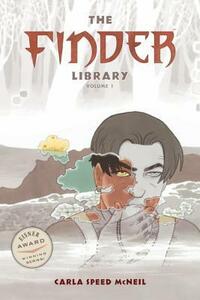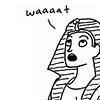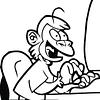Take a photo of a barcode or cover
I already own the self-published Finder books, but a) I like big fat bricks of comics, and b) I want Finder to stick around and figure throwing some extra $$$ at it won't hurt its chances!
Reading it in a 600-page tome, I realize how dense each chapter is. I spend probably 20 minutes on each issue, including the end notes that give more depth to the world Speed's created. If you've not read Finder, it's the ultimate in world-building - a caste-based society, with city and rural cultures, very stratified, very traditional. Our point of view character is mostly a nomadic fellow named Jaeger, a finder (scout, explorer, man who crosses boundaries) and sin-eater (ritual scapegoat).
The first book contains the following arcs: "Sin-Eater," in which Jaeger attempts to orchestrate certain circumstances between Brigham Grosvenor, a former police/military man who's had a severe breakdown (and also used to be Jaeger's commanding officer) and his wife and three children, for the protection of the family from Brigham's paranoia and insanity. A great exploration of family and community dynamics, as husband and wife come from different clans and have many different expectations upon themselves and upon their children.
Also included is "King of the Cats," my least favorite arc in the series, a semi-confused saga of the lion-like Nyimia people selecting a new king while the Ascians (Jaeger's half-Ascian) work out a treaty with the leader-less cats. And finally, my (and everyone else's) favorite arc, "Talisman," as the youngest of the Grosvenor children takes center stage in a tale about the power of stories and the difficulty of creativity.
Anyway, Finder's a pretty brilliant series. The illustrations are great, the dialogue is strong, and best of all - Speed puts a tremendous amount of thought into every panel. Clothing, culture, societal norms and standards - everything's thought through and nothing is done randomly. This is my third time reading these stories and I keep finding new and interesting ideas in it. It never gets old.
Reading it in a 600-page tome, I realize how dense each chapter is. I spend probably 20 minutes on each issue, including the end notes that give more depth to the world Speed's created. If you've not read Finder, it's the ultimate in world-building - a caste-based society, with city and rural cultures, very stratified, very traditional. Our point of view character is mostly a nomadic fellow named Jaeger, a finder (scout, explorer, man who crosses boundaries) and sin-eater (ritual scapegoat).
The first book contains the following arcs: "Sin-Eater," in which Jaeger attempts to orchestrate certain circumstances between Brigham Grosvenor, a former police/military man who's had a severe breakdown (and also used to be Jaeger's commanding officer) and his wife and three children, for the protection of the family from Brigham's paranoia and insanity. A great exploration of family and community dynamics, as husband and wife come from different clans and have many different expectations upon themselves and upon their children.
Also included is "King of the Cats," my least favorite arc in the series, a semi-confused saga of the lion-like Nyimia people selecting a new king while the Ascians (Jaeger's half-Ascian) work out a treaty with the leader-less cats. And finally, my (and everyone else's) favorite arc, "Talisman," as the youngest of the Grosvenor children takes center stage in a tale about the power of stories and the difficulty of creativity.
Anyway, Finder's a pretty brilliant series. The illustrations are great, the dialogue is strong, and best of all - Speed puts a tremendous amount of thought into every panel. Clothing, culture, societal norms and standards - everything's thought through and nothing is done randomly. This is my third time reading these stories and I keep finding new and interesting ideas in it. It never gets old.
Dense with a future history populated by an evolving set of fully realized characters, Finder remains one of the those most original and expansive comics to exist. The worldbuilding is literally so good that you get angry sometimes that you can't peek behind the doorways or leave the story to go experience the full scope of the world. While it follows our main character Jaeger most of the time, the Grosvenor family is the hub on which the stories rotate and from which offshoots form.
Seriously, read this.
Seriously, read this.
Hailed as a triumph of independent comix publishing, The Finder Library collects the first nine or so of Carla Speed McNeil’s stories about a aboriginal hunter and sin-eater who wanders through a fixed, technological society and exposes its various hypocrisies and fallacies. Not going to lie - the artwork in the first few chapters is really crude and hard to look at. But McNeil eventually finds her pace and the visuals improve. But the story is always this kind of ball-of-hash experience that either you’re going to synch with and love, or you’re just going to see it as a rambling jumble of half-baked philosophies of the kind college sophomores trade in late at night. I am in that second camp, so take what I say next with the appropriate measure of salt: Warren Ellis might have been a huge fan of this, but the sad reality is that you get everything you need to know about this series by reading his introduction to The Finder Library 2 than you do from plowing through 1,200 pages of what increasingly feels like self-indulgent nonsense.
Probably my all-time favorite comic. I recall when I first read part 1 of the Sin-Eater storyline, in my late twenties, I almost cried in the middle of a coffee shop while reading one of Jaeger’s first dream sequences, and not for any coherent reason. There was just something utterly moving in the sequence of images. I was similarly shaken at various moments throughout the book, sometimes by the emotional peaks and valleys reached by the characters, and sometimes just because McNeill had fit the panels together in an inexplicably perfect, searing order. That’s what this series offers, in addition to a great post-apocalyptic environment, cute animal people, and darkly funny family drama: a piercingly beautiful visual landscape that captures the most unpredictable feelings that surface in dreams.
This is quite simply a remarkable achievement. Carla Speed McNeil, over a period in excess of 20 years, has written and drawn a world and characters as unique as they are relatable. These stories feel more sculpted than written, more crafted than drawn. This is a labor of love and it shows.
It truly is not possible to summarize the story being told here; good thing, then, that plot is not the most important thing about Finder. What matters is the emotional investment McNeil has put into the characters and how that translates into our ability to empathize and imagine ourselves into their skins. These are strange characters (and in some cases downright pathological) but the magic of her writing is that we feel ourselves thoroughly into these lives. I honestly don't believe that a story written over a shorter period of time could have had the same impact; the years McNeil spent crafting these lives shows so clearly in the slow and graceful development of people we come to know and love.
To give a taste of what you are in store for here: the Finder is Jaeger, a man without a tribe or home who pops in and out of the lives of Emma, her children, and their father, the estranged and very strange Brigham. This is a futuristic time in a world perhaps our own world, perhaps not, but with many recognizable characteristics and people. For the most part they live in domed cities, outside of which life is harsh and punishing. They have divided into distinct tribes and for the most part do not intermingle and nearly never intermarry, though Emma and Brigham are an exception to this rule, which makes them and their children outcasts in both tribes. Yet they make their way in the world which, when you get right down to it, is the best most of us can expect to manage.
At the risk of overstating my case, though, I would not want to give the impression that the setting, while alluring, is the true attraction of Finder. What makes it unique and compelling is the people we get to know, love, loathe, appreciate, and grieve for. No matter their physical form, these are very human creatures and as they open their hearts to us, we respond with love and deep fellow feeling. There is humor here, too, on every page, pathos and obscure references aplenty (which McNeil extensively explicates in her endnotes), but we come to Finder and remain because of our connection to these very real, complex people.
It truly is not possible to summarize the story being told here; good thing, then, that plot is not the most important thing about Finder. What matters is the emotional investment McNeil has put into the characters and how that translates into our ability to empathize and imagine ourselves into their skins. These are strange characters (and in some cases downright pathological) but the magic of her writing is that we feel ourselves thoroughly into these lives. I honestly don't believe that a story written over a shorter period of time could have had the same impact; the years McNeil spent crafting these lives shows so clearly in the slow and graceful development of people we come to know and love.
To give a taste of what you are in store for here: the Finder is Jaeger, a man without a tribe or home who pops in and out of the lives of Emma, her children, and their father, the estranged and very strange Brigham. This is a futuristic time in a world perhaps our own world, perhaps not, but with many recognizable characteristics and people. For the most part they live in domed cities, outside of which life is harsh and punishing. They have divided into distinct tribes and for the most part do not intermingle and nearly never intermarry, though Emma and Brigham are an exception to this rule, which makes them and their children outcasts in both tribes. Yet they make their way in the world which, when you get right down to it, is the best most of us can expect to manage.
At the risk of overstating my case, though, I would not want to give the impression that the setting, while alluring, is the true attraction of Finder. What makes it unique and compelling is the people we get to know, love, loathe, appreciate, and grieve for. No matter their physical form, these are very human creatures and as they open their hearts to us, we respond with love and deep fellow feeling. There is humor here, too, on every page, pathos and obscure references aplenty (which McNeil extensively explicates in her endnotes), but we come to Finder and remain because of our connection to these very real, complex people.
I'd have to rate this book 2.5 to 4 stars. 'Sin-Eater' was rough, dragged, and at times confusing. The art by the end became enjoyable, and sometimes I loved the world building. Other times everything seemed shallow and silly. Then there would be some serious character building, and I'd hang in there when five minutes before I had contemplated bailing. 'Talisman' was by far my favorite. It felt as if the writer had finally figured out what she wanted to say and how she wanted to say it.
It wasn't until I read the notes at the end that I saw the heart of the story. Her world building came together, and I could see what she'd been fumbling around trying to say. As I read the notes I kept saying to myself 'Why the hell wasn't this in the book?! That is freaking interesting!'. Having finished it I really think she should have just written a novel. The art is fine, but I can't say that I would miss it, but I absolutely think it held her back. I think she tried to hard to cram this story into this medium and too much valuable story was lost because of it. The notes shouldn't fill in half of what was missing from a 600 page graphic novel. You're doing it wrong if that's the case. All that being said, Talisman was solid, so McNeil CAN write a complete story in graphic novel form. The world building in Talisman wasn't rubbed in your face and it flowed. I'll keep reading because of that.
It wasn't until I read the notes at the end that I saw the heart of the story. Her world building came together, and I could see what she'd been fumbling around trying to say. As I read the notes I kept saying to myself 'Why the hell wasn't this in the book?! That is freaking interesting!'. Having finished it I really think she should have just written a novel. The art is fine, but I can't say that I would miss it, but I absolutely think it held her back. I think she tried to hard to cram this story into this medium and too much valuable story was lost because of it. The notes shouldn't fill in half of what was missing from a 600 page graphic novel. You're doing it wrong if that's the case. All that being said, Talisman was solid, so McNeil CAN write a complete story in graphic novel form. The world building in Talisman wasn't rubbed in your face and it flowed. I'll keep reading because of that.
I either forgot or didn't know that comics could be soooo good, sooo dense, and that fictional world-building (speculative fiction? sci-fi?) could be so rich. This quickly moved to my all-time favourite comics list and before I had to return volume 2 to the library I was compelled to purchase the whole collection. Just wow.
This was one of those books where, even as I'm reading it, I recognize the impact it's going to have on me as a person and on my life in general. I can't even describe what the plot was, let alone why it was so earth-shatteringly significant for me to experience, but it truly was. Everything, from the art to the characterization to the storylines, was complex and rich and contradictory and confusing while inherently making complete sense. Thank you, McNeil, for this series.
Engrossing. Disjointed and confusing in some places; I the footnotes at the end help significantly but I didn't get to those until the end. Sometimes you can definitely see that this is a product of the 90s, such as the send-up of a Disneyland-like place. Reading the book and its ideas of what the future would look like in 2023 results in a jarring combination of impressive presentience and stodgy old-fashionedness. Like they have pocket AI but no cell phones.
Complex, dense and utterly fascinating. I can't remember the last time I was so taken aback by a graphic novel.
The Finder Library: Volume 1 collects the first three books of the series Finder, originally self-published by author Carla Speed McNeil. The series has been running since 1996, but somehow I managed to go all this time without ever hearing of it.
Finder is science fiction, but it's not of the spaceships and aliens type. It's not even any kind of high-concept sci-fi, although there are lots of recognizable tropes to be found in the background.
What McNeil has done is rather than go about world-building in the traditional science fiction sense, she's focused her story like a laser-beam on a handful of characters, and lets the world develop around them.
This being the first volume (or really the first three) it does take a little while to get going. The first story is very different from everything that follows, and is a little muddled. But once she gets going, it's really quite amazing.
The protagonist for most of the book is Jaeger, the titular Finder. He's half Ascian, which is a sort of native american tribe. Then there's his friend and frequent lover Emma and her extended family. Sometimes the story is told from Jaeger's point of view, sometimes it's Emma's or her psychotic ex-husband and sometimes it's one of her three children.
The story is so dense, that's extremely difficult to summarize in just a few sentences. Needless to say, this is a very human story, and the sci-fi elements are there to add flavor, not to distract from it.
If you like deep, complex storytelling, you owe it to yourself to read this book.
The Finder Library: Volume 1 collects the first three books of the series Finder, originally self-published by author Carla Speed McNeil. The series has been running since 1996, but somehow I managed to go all this time without ever hearing of it.
Finder is science fiction, but it's not of the spaceships and aliens type. It's not even any kind of high-concept sci-fi, although there are lots of recognizable tropes to be found in the background.
What McNeil has done is rather than go about world-building in the traditional science fiction sense, she's focused her story like a laser-beam on a handful of characters, and lets the world develop around them.
This being the first volume (or really the first three) it does take a little while to get going. The first story is very different from everything that follows, and is a little muddled. But once she gets going, it's really quite amazing.
The protagonist for most of the book is Jaeger, the titular Finder. He's half Ascian, which is a sort of native american tribe. Then there's his friend and frequent lover Emma and her extended family. Sometimes the story is told from Jaeger's point of view, sometimes it's Emma's or her psychotic ex-husband and sometimes it's one of her three children.
The story is so dense, that's extremely difficult to summarize in just a few sentences. Needless to say, this is a very human story, and the sci-fi elements are there to add flavor, not to distract from it.
If you like deep, complex storytelling, you owe it to yourself to read this book.







